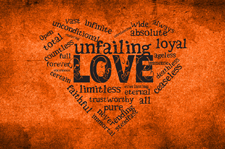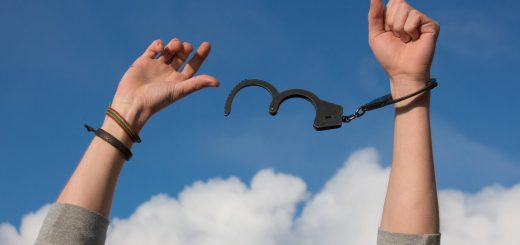Right living: what really matters to God (imho lol)
Leviticus 19 is entitled Various Laws in my Bible because it is a collection of various laws – random laws on all sorts of random topics; some we have heard before, others way off the map! And all given for the same reason –
Be holy because I, the Lord your God, am holy. Leviticus 19:2
The first few refer to some of the Ten Commandments and how to offer correct offerings – ground we have covered before. The next one is interesting and the basis of a story to come further on in the Bible (when we get to the Book of Ruth) –
When you reap the harvest of your land, do not reap to the very edges of your field or gather the gleanings of your harvest. Do not go over your vineyard a second time or pick up the grapes that have fallen. Leave them for the poor and the foreigner. I am the Lord your God. Leviticus 19:9-10
This is about showing a level of generosity and mercy to the poor and the foreigner. You have enough so leave the rest. I follow a radical alternative Christian thinker and liver on Facebook called Shane Claiborne and he wrote a piece this week on the ‘THEOLOGY OF ENOUGH’. Here are some excerpts – click on the link for the whole thing.
Rather than reacting to the extremes of the “prosperity Gospel” (God blesses people with wealth) or the “poverty Gospel” (God demands that all of us live in poverty), I want to suggest we build a new framework for thinking about money and possessions — a theology of ENOUGH. The idea is that God wants every one of us to have the things we need. And there is enough for everyone’s need but not enough for everyone’s greed (as Gandhi said).
There is a vision weaved throughout Scripture of “this day our daily bread”. One of the earliest stories we have in the Bible is Exodus 16. Before God’s people even have the 10 commandments they are commanded by God to take only enough food for each day. We have come a very long way from God’s vision for everyone to have this day our daily bread. Just consider this: The world’s three richest people own more than the combined economies of 48 countries. 85 people own the same amount of wealth as 3.5 billion (half the world). We live in a time of unprecedented inequity between the rich and poor. It’s time to rediscover this theology of enough.
We hear the echo of “enough” in the Lord’s Prayer as we are taught to pray for “this day our daily bread”. Not just “my bread”. Not tomorrow’s bread. But for all of us to have enough TODAY.
I will never forget learning one of my best lessons in economics — from a homeless kid in India. Every week we would throw a party for the street kids, kids 8-10 years old who were homeless, begging all day to survive. Each Tuesday we would get about 100 of them together and throw a party, play games, eat a big meal. One week, one of the kids I had grown close to told me it was his birthday. So I got him an ice cream. He was so excited he stared at it mesmerized. I have no idea how long it had been since he had eaten ice cream. But what he did next was brilliant. He yelled at all the other kids and told them to come over. He lined them up and gave them all a lick. His instinct was: this is so good I can’t keep it for myself. In the end, that’s what this whole idea of generosity is all about. Not guilt. It’s about the joy of sharing. It’s about realizing the good things in life – like ice cream – are too good to keep for ourselves.
I love that ice cream story. Hopefully it will find a place to lodge in your consciousness as it has in mine.
The next verses are about right living, as relevant today as they were then –
Do not steal.
Do not lie.
Do not deceive one another.
Do not swear falsely by my name and so profane the name of your God. I am the Lord.
Do not defraud or rob your neighbor.
Do not hold back the wages of a hired worker overnight.
Do not curse the deaf or put a stumbling block in front of the blind, but fear your God. I am the Lord.
Do not pervert justice; do not show partiality to the poor or favoritism to the great,but judge your neighbor fairly.
Do not go about spreading slander among your people.
Do not do anything that endangers your neighbor’s life. I am the Lord.
Do not hate a fellow Israelite in your heart. Rebuke your neighbor frankly so you will not share in their guilt.
Do not seek revenge or bear a grudge against anyone among your people, but love your neighbor as yourself. I am the Lord. Leviticus 19:11-18
 A pretty good checklist for everyday life, wouldn’t you agree? Rules for living life to the full based on honesty, integrity, justice, respect, equality, forgiveness and love. I wonder which one strikes a chord with you.
A pretty good checklist for everyday life, wouldn’t you agree? Rules for living life to the full based on honesty, integrity, justice, respect, equality, forgiveness and love. I wonder which one strikes a chord with you.
A couple of weird ones are thrown in here – to maintain a level of purity (be holy, as I am holy) across all aspects of life –
Do not mate different kinds of animals.
Do not plant your field with two kinds of seed.
Do not wear clothing woven of two kinds of material. Leviticus 19:19
Then there are specific instructions about what to do if a man sleeps with a slave girl who is promised to another and when it is safe to eat the fruit of a tree planted in a new land – all very random, right?
And here are the last in this mixed bag – a few here that will grab your attention, I think –
Do not eat any meat with the blood still in it.
Do not practice divination or seek omens.
Do not cut the hair at the sides of your head or clip off the edges of your beard.
Do not cut your bodies for the dead or put tattoo marks on yourselves. I am the Lord.
Do not degrade your daughter by making her a prostitute, or the land will turn to prostitution and be filled with wickedness.
Observe my Sabbaths and have reverence for my sanctuary. I am the Lord.
Do not turn to mediums or seek out spiritists, for you will be defiled by them. I am the Lord your God.
Stand up in the presence of the aged, show respect for the elderly and revere your God. I am the Lord.
When a foreigner resides among you in your land, do not mistreat them. The foreigner residing among you must be treated as your native-born. Love them as yourself, for you were foreigners in Egypt. I am the Lord your God.
Do not use dishonest standards when measuring length, weight or quantity. Leviticus 19:26-35
I had that verse about tattoos quoted at me when I was showing off the tattoo that I got for my fortieth birthday (almost exactly ten years ago then!) during my house group one evening. I hadn’t been aware of the existence of that verse before then and it threw me. My initial reaction was ‘Grr….that’s another thing I’ve done wrong’, closely followed by ‘Really? God really cares about this? Surely He has far more important things to care about?’ It’s a shame I didn’t know the passage well enough to comment on the speaker’s hair cut or ask to see the label in her clothes to see if it was made form mixed fibres or to reassure her that I hadn’t got it done as a sign of mourning as suggested in the context of the verse!
We do tend to pick and choose from these laws, it seems, to justify our cultural likes and dislikes. If you don’t like my tattoo, that’s fine, but don’t try and drag God into it.
 Having said that, I am about to pick some of these laws that do still stand in my view – showing respect for the elderly, the foreigner and the worker. These are the things that really matter. These are the things Jesus was continuing to teach on thousands of years later. These are the things that need challenging in our society today.
Having said that, I am about to pick some of these laws that do still stand in my view – showing respect for the elderly, the foreigner and the worker. These are the things that really matter. These are the things Jesus was continuing to teach on thousands of years later. These are the things that need challenging in our society today.
So challenge me about my tattoo and I will challenge you about your attitude to the vulnerable in society. In fact, I will do that anyway.
How do we treat the people around us – our colleagues, the customers, our neighbours, the individuals on the bus, the people we read about in the media, the communities across the world who grow our food and make our clothes…..?
These are the things that really matter. These are the things that really matter to God.












